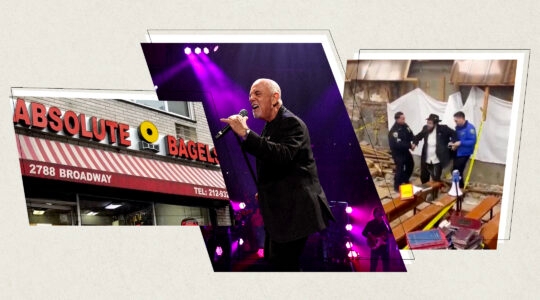As president, GOP longshot contender Alan Keyes says he would be guided by a principle embraced by the most extreme elements of the American Jewish and Israeli society: That Jordan is a Palestinian state, making an entity on the West Bank superfluous.
“Jordan is Palestine,” Keyes told The Jewish Week Tuesday. “The king accepted that when he took responsibility for the Palestinians.” The Palestinian Authority, he said, is “a stateless actor that does not have the wherewithal to make peace.”
In a wide-ranging interview initiated by Keyes’ New York coordinator, Niger Innis, the blunt-talking Keyes shattered numerous icons in American politics while insisting that the United States was on the verge of a “return to the dark ages of human oppression” because of an abandonment of what he considers moral values.
“I’m about the re-establishment of the values that make freedom possible,” said Keyes, a former deputy ambassador to the United Nations and State Department official under Ronald Reagan and conservative talk-show host. “America can only survive in the presence of moral ideas.”
Despite his hawkish support of Israel, Keyes expressed no sympathy for Jonathan Pollard, who was convicted of giving U.S. secrets to the Jewish state. “There is no reason to make a distinction” that Pollard spied for an ally, said Keyes. “If you get caught with your hands in the cookie jar, don’t expect any Keyes administration to feel sorry for you.”
In perhaps his most radical view, Keyes disputed the notion that the Constitution requires the separation of church and state. “The government itself can’t take a religious view, but it can give free choice to people and support them after they make that choice,” says Keyes, who supports school vouchers, charitable choice and other similar programs. Keyes said he would set up committees to “certify” organizations to receive government funding, but would exclude “entities that do not respect the moral principles that make life and freedom possible,” such as the Nation of Islam and Planned Parenthood.
Keyes made no apologies for speaking at the controversial Bob Jones University in South Carolina, which has been accused of bigotry. “When you have a community that has been subject to a bad influence, do you just leave them there, or do you go and try to expose them to a better influence?” he asked. Keyes said that as a black Roman Catholic married to an Asian woman, he “violated every principle they believe in” and made a point just by walking through the door.
Keyes denied that the four police officers acquitted of shooting Amadou Diallo were engaged in racial profiling. “They didn’t stop some black guy who was wearing a different outfit just because he’s black. They stopped a guy who was wearing the very same outfit that was described to them.” Keyes said he had told his own son to avoid dressing in clothes that might be associated with inner-city youth. “If you dress like a thug, expect to be treated like a thug, and don’t come whining to me if some police officer gives you the eye.”
Keyes said the proposed passage of federal and state hate crimes legislation would be “the essential government step needed to legislate thought.
“I don’t understand why, of all people in the world, Jewish folks wouldn’t understand the danger of giving the government the power to criminalize attitudes. Don’t think you’re going to be exempt from the consequences when we have thought control in the government.”
Keyes admitted it would take “a miracle” for him to win the nomination. But noting the frequent comparisons to Don Quixote, he pointed out that by the end of the Cervantes novel “he had achieved everything he set out to achieve.”
The New York Jewish Week brings you the stories behind the headlines, keeping you connected to Jewish life in New York. Help sustain the reporting you trust by donating today.




